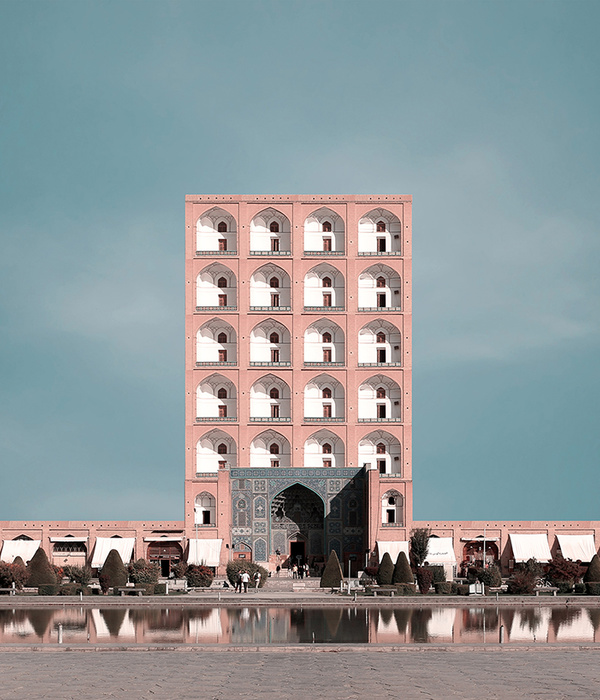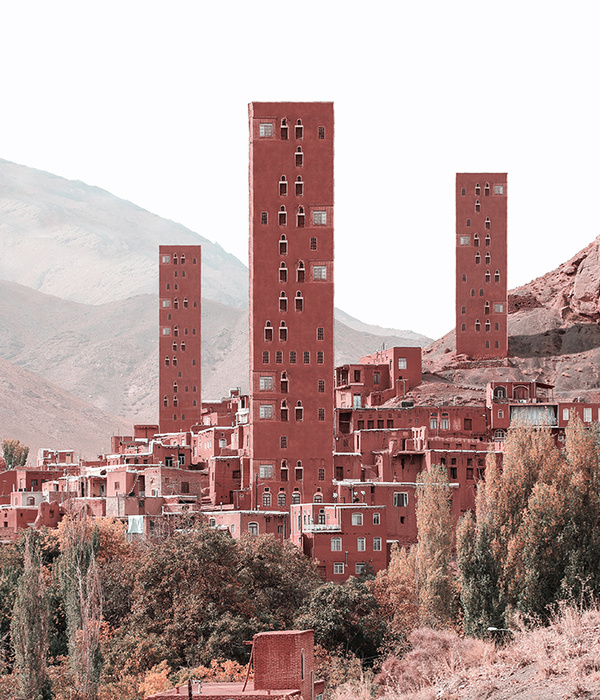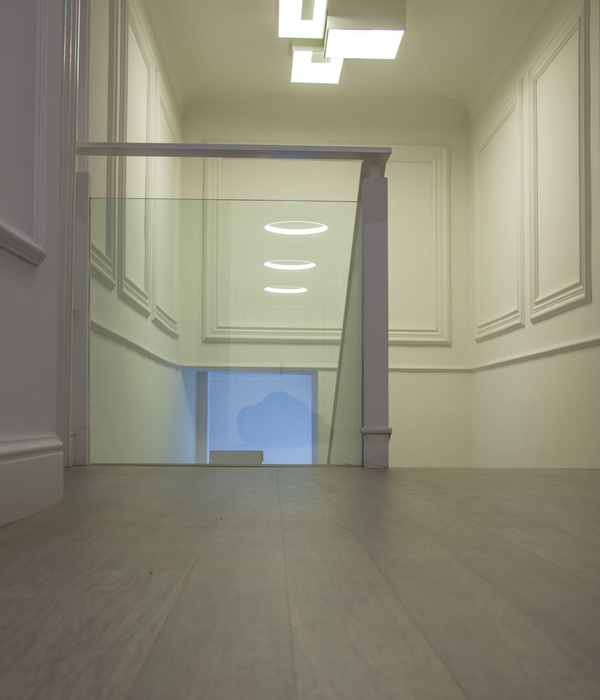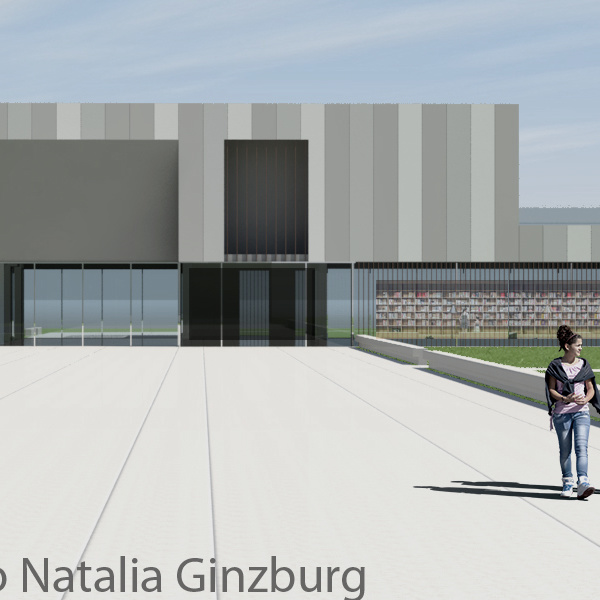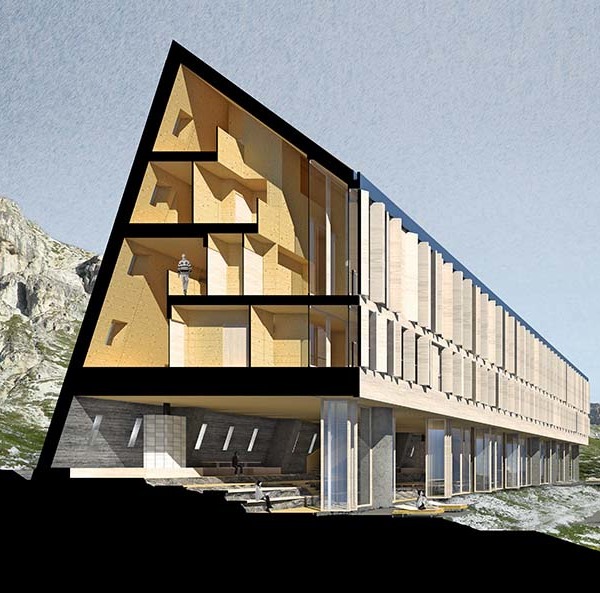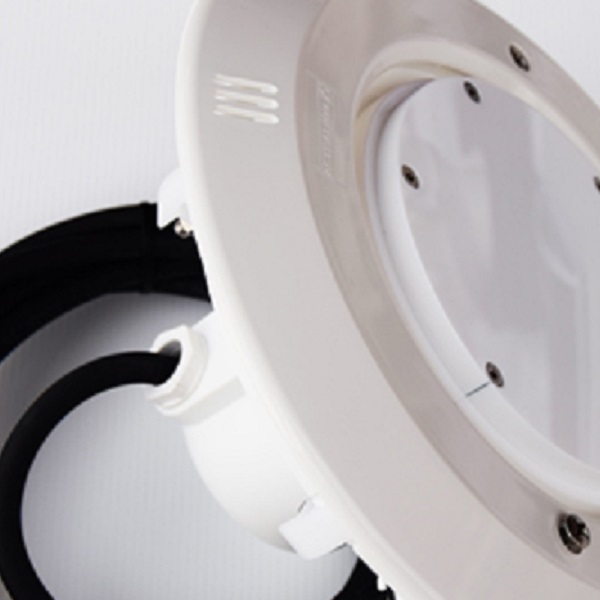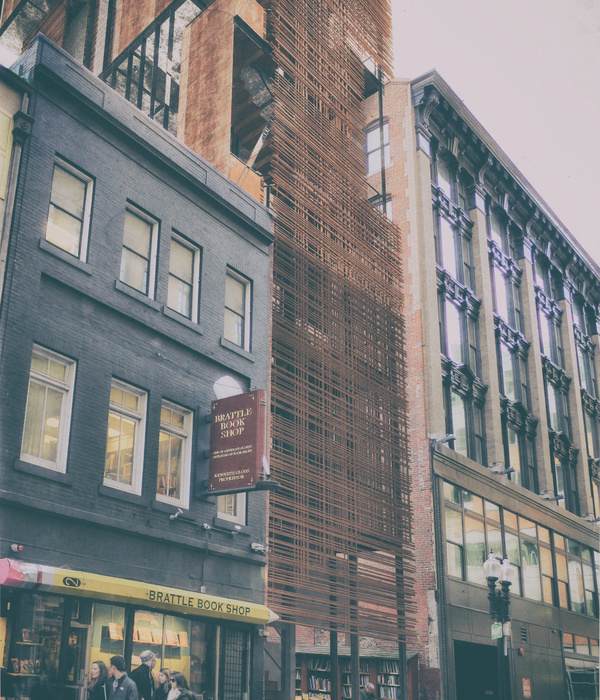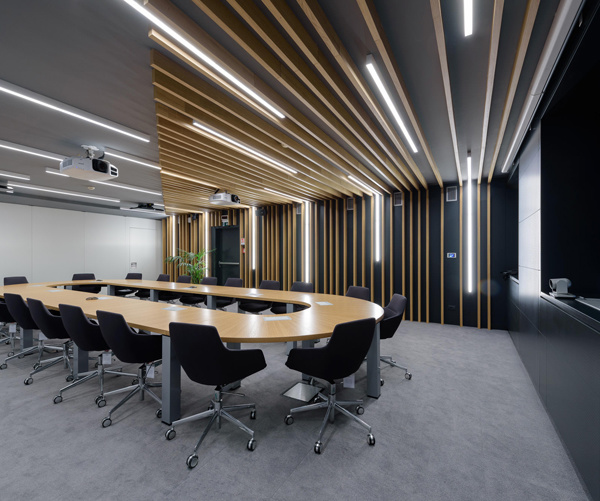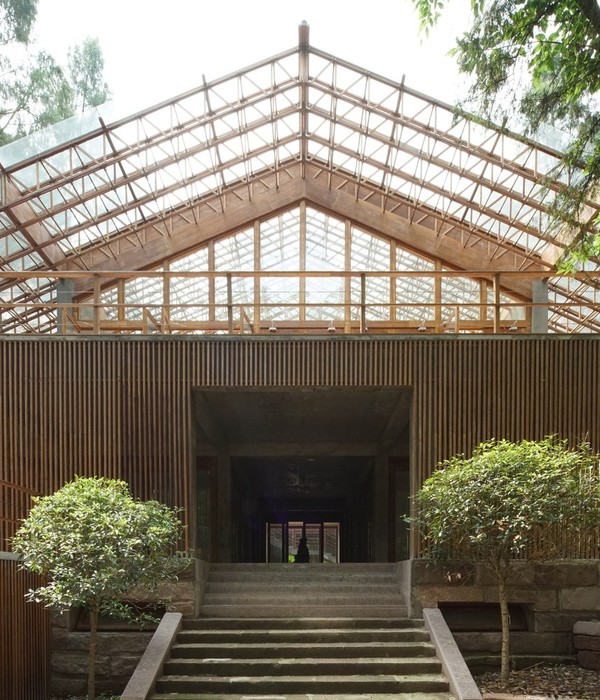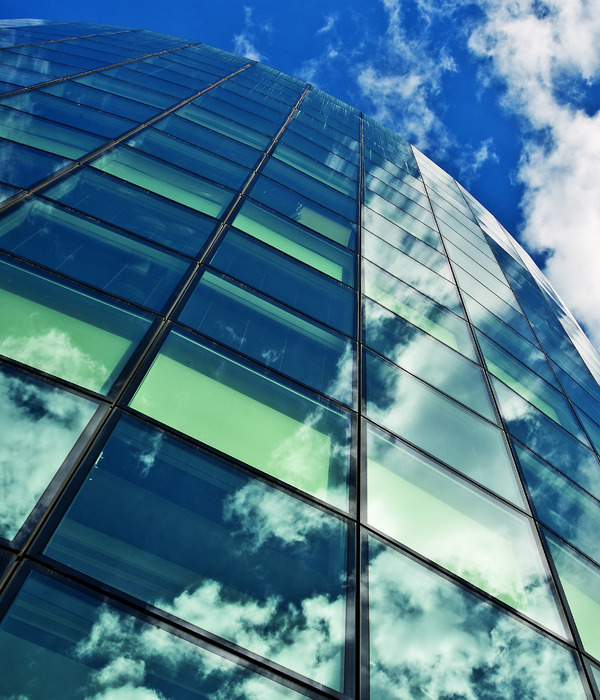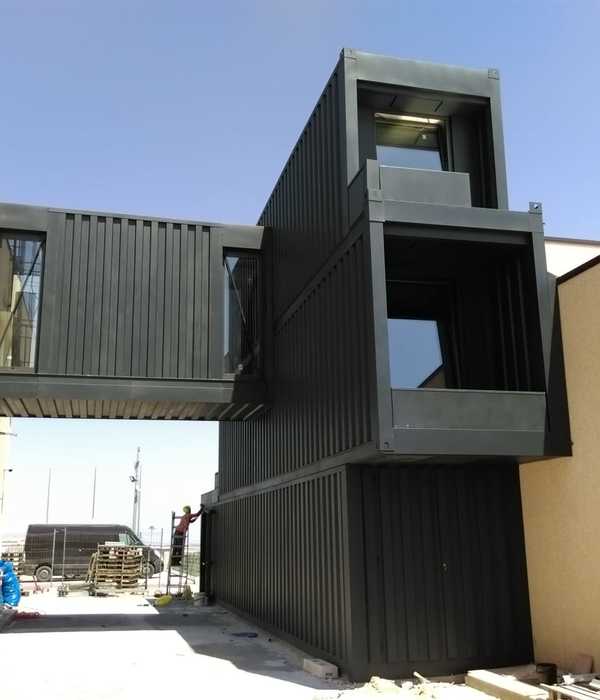- 项目名称:园艺家旗舰店——世界花园大会中心
- 项目位置:浙江嘉兴海宁
- 设计公司:森上建筑设计
- 主要材料:钢材,铝板,玻璃幕墙
- 摄影:邱日培
如果将温室理解为有序调节光、温度、湿度与风,并供养花草生长的地方。那么依托温室进行售卖的花园中心,便可以想象成捕捉了光影与自然秩序的场所。
If the greenhouse is understood as an orderly adjustment of light, temperature, humidity,wind and the place where plant grows,the garden center which relies on the greenhouse for sale can be imagined as a place where light,shadow and nature order are captured.
▼项目鸟瞰,aerial view © 邱日培
作为个体专业性较强的花园中心,往往以温室作为其主体,而花草可以看做这里的主人。相比于普通卖场的常态,温室更强调植物的生长环境,近似于一个庇护植物的场所。根据植物的栽培分布,花园中心将分为购物体验区、植物区和资材区三个部分。作为一个消费场所,顾客的参与与体验是需要被重视的,如何处理人与植物的共处,调节建筑与温室的衔接便成为设计亟需解决的问题.进而使得空间成为集销售、游玩与体验交流的主题性公共场所。
▼轴测图,axonometry © 森上建筑设计
As a garden center with strong individual professionalism, it often takes the greenhouse as its main part, and the plans can be regarded as the owners here. Compared with the ordinary market, the growing environment is more empathized, which is similar to a place for sheltering plants. According to the distribution of plants, the garden center is divided into three parts: shopping experience area, plant area and material area. As a place of consumption, the participation and experience of customers need to be paid more attention to. Therefore, how to deal with the coexistence of people and plants, and how to adjust the connection between the building and the greenhouse become the problems that need to be improved in design.
▼(左)资材区,(中)温室植物区,(右)购物体验区,(left)material area,(middle)plant area,(right)shopping experience area © 邱日培
从温室开始:连绵的屋架与有规范性的通高是温室所具备的特点,特定的属性基本确定了温室的建筑形态,植物对于光与空气的需求则限定了温室建筑的立面材质。作为一个栽培植物的玻璃大棚,很难将温室以空间化的形态进行组织重构,我们可以将其看作一个更接近于调节自然的开发区域,仅对于阳光、风和温度、湿度进行了有序的调控,以使得花草可以在此顺利的生长。
▼(左)温室,(右)交易区,(left)green house,(right)trading area © 森上建筑设计
Start with greenhouse:Continuous roof truss and standard height are the characteristics of greenhouse. The specific attribute basically determines the architectural form of greenhouses. The demand of plants for light and air limits the facade materials of greenhouse buildings as well. As a glass greenhouse for cultivating plants, it is difficult to be reconstructed into a spatial form. Thus,it can be regard as a developing area that can regulate the nature. Sunshine, wind, temperature and humidity are regulated orderly, so that plans can grow smoothly here.
▼温室与交易区,green house and trading area © 邱日培
温室的叠合:不同于超市与百货类的收银区,花园中心的交易区也是顾客休憩与体验的区域。作为一座离温室最近的卖场,是植物的中转站,也是人们的交流体验点,汲取园艺与生活之间的共通性,收银空间对建筑的结构、立面以及空间做了自然化的组织,使得人们驻留的区域具备了自然的氛围。
Superposition of greenhouses:Different from the cash register of supermarkets or other stores, the trading area of the garden center is also the area for customers to rest and experience. As a store nearest to the greenhouse, it is also a transit station for plants and a point for people to exchange. Absorbing the commonality between gardening and life, the cashier space has made a natural organization for the structure, facade and space of the building, which makes the area where people stay have a natural atmosphere.
▼交易区,组织自然的立面,trading area,a natural organization for facade © 邱日培
两者的叠加与交织,使得建筑形成了全新的秩序,温室的结构阵列性得以演化。现浇的混凝土秩序配合自然的形态感营造了更具生长化的空间。建筑的整体节奏感也随着功能区的分布形成了相应连贯的形体。
The superposition and interweaving make the building form a new order and the structural array of the greenhouse evolve. The order of cast-in-place concrete coordinates with nature form create a more growing space. With the distribution of functional areas, the overall rhythm of the building also comes into a coherent form.
▼连贯的形体,coherent form © 邱日培
▼资材区入口,entrance of material area © 邱日培
立面的组织形态从树丛提取元素,制造自然随机的阵列。格栅系统使植物在避免阳光直射的同时,也给人以联想树冠与树荫的启示。从树干到树冠,光影的过滤从疏到密,仿佛树木摇曳的光影。格栅自下而上形成三种单元模数,第一层的格栅最宽,与玻璃幕墙结合,在消费者的视线内最大限度纳入外部的风景及阳光,第二层格栅变窄,形成相对规律的立面组织形态,第三层格栅最为细密,与折形屋面呼应,具有丰富的曲折变化,形成自然连绵的树荫象形,最大限度的过滤阳光的直射。通过立面格栅的三种节奏的变化,不仅形成丰富有趣的立面光影秩序,还为消费者提供了一种深处密林的光影想象。
▼树影的疏密节奏,density rhythm of tree shadow © 森上建筑设计
The organization form of the facade extracts elements from the trees. It creates a natural and random array. The grid system not only avoids the direct sunlight, but also gives people the enlightenment of associating the crown and shade. From the trunk to the crown, the filtering of light and shadow is from sparse to dense, like the flickering light and shadow of trees. The grids have three unit modules from bottom to top. The first floor is the widest. Combined with glass curtain wall, it can maximize the external scenery and sunshine in the sight of consumers. The grids on the second floor are narrower to form a relatively regular facade organization. The third layer of grids are most dense, which corresponds to the folded roof, with rich twists and turns, forming a natural continuous shadow image, filtering the direct sunlight to the maximum extent. Through the changes of the three rhythms of the facade grid, not only an interesting facade light and shadow order is created, but also a deep forest imagination is provided for consumers.
▼立面与自然的抽象关系,abstract relationship between facade and nature © 邱日培
对应温室的双坡顶,设计师希望建立一种现浇的框架秩序。与温室一样为花卉遮风挡雨,树冠空间的遮蔽感既满足了自然性的秩序也对应空间的氛围。因此,选用树形的混凝土结构作为模数单元,以此模数组织形成连续分布的树干与枝干,相互交织的曲折变化让屋面产生了起伏,如置身林下踱步看花购物,营造出自由闲适的空间氛围。树形结构单元为四坡顶,单元之间的错向拼接形成了连续的折面屋顶,每单元的衔接交点分别形成三个标高,如同抽象的树冠,从主体建筑中心往四周逐渐降低,借以形成自然有序的排水体系。
▼结构的秩序,order of structure © 森上建筑设计
Corresponding to double slope top of the greenhouse, designers hope to establish a cast-in-place framework order. Similar as greenhouse, it can shelter flowers from wind and rain, at the same time, the sheltering sense of canopy space not only satisfies the order of nature but also the atmosphere of space. So that the tree-shape concrete structure is selected as the module unit to form a continuous distribution of trunk and branch. Intertwined twists make the roof undulate, such as walking under the forest, which creating a free and comfortable space atmosphere.
▼树冠状结构,tree crown structure © 邱日培
作为旗舰店的花园中心在功能使用上不仅于温室卖场,也在每年的世界花园大会时作为主体展馆使用,成为集售卖、展览、体验于一体的花园中心。
As a flagship store, the garden center is not only used as a greenhouse market, but also as the main exhibition hall at the World Garden Conference annual, becoming a garden center integrates sales, exhibition and experience.
▼夜景,night view © 邱日培
▼平面,plan © 森上建筑设计
▼立面,elevations © 森上建筑设计
{{item.text_origin}}

